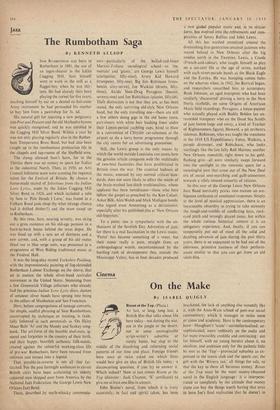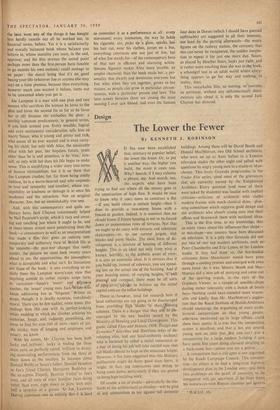Cinema
On the Make
QUIGLY
By IS A BEL
Room at the Top. (Plaza.)
AT last, at long, long last, a British film that talks about life here today—not during the war,. not in the jungle or the desert: not in some unimaginable script-writer's suburbia or stately home, but slap in the middle of the dissolving and reforming social patterns of our time and place. Foreign friends have once or twice asked me which films would best give an idea of British life today: a disconcerting question, if you try to answer it. 'Which indeed? Now at last comes Room at the Top (director : Jack Clayton; 'X' certificate) to give me at least one film in answer.
John Braine's novel, from which it is (very accurately, in fact and spirit) taken, has been
bracketed, for lack of anything else remotely like it, with the Amis-Wain school of post-war social 'commentary; which it manages to make seem precious and academic. Here is the contemporary hero—Maugham's `scum'—un intellectualised, un- sophisticated, more ruthlessly on the make and far more irresistibly credible and convincing : out for himself, with no young heroics about it, no idealism, and ambition only for the pathetic little he sees as the `Top'—provincial suburbia as ex- pressed in the tennis club and the sports car, the girl with the 'Riviera tan,' all things for sale, so that the key to them all becomes money. Room at the Top most be the most money-obsessed novel in the English language : it is interpene- trated so completely by the attitude that money alone can buy the things worth having that even its hero Joe's final realisation that he doesn't in
the least want any of the things it has bought him hardly cancels out all he worked out, in financial terms, before. Yet it is a satisfactorily and morally balanced book whose balance you believe in, whose morality you must, in the end, approve; and the film stresses the moral point Perhaps more than the first-person hero (unable to go outside his own outlook) could manage to on paper : the moral being that it's no good basing your life (whatever Joe or anyone die may say) on a false premise, because then everything, however much you wanted it before, turns out to be unwanted when you get it.
Joe Lampton is a man with one plan and two women who. sacrifices the woman he loves to the plan and loVeS the second (in so far as he loves her at all) because she embodies the plan : a terribly common predicament, in general terms, if yctu look around you. Every sensible, logical and even sentimental consideration tells him to marry Susan, who is young and pretty and rich, who seems all he ever wanted and is even carry- ing his child; but only with Alice, the unsuitable Alice with her past, her hopeless future, years older than he is and penniless, is he 'true,' him- self, so only with her does hig life begin to make sense/This is simplifying a wider story into terms of human relationships; but it is on them that Joe Lampton crashes, for, far froth being coldly ruthless, he is a warm-hearted soul who responds to love and sympathy and 'comfort, whose sus- ceptibility to kindness or damage 'is at once his weakness and his attraction. Not an original character, Joe; but an unmistakably true one.
And, with this 'contemporary and quite un- literary hero, Jack Clayton (enormously helped by Neil Paterson's script, which is racy and amus- ing and touching just where it ought to be, and at times seems almost more penetrating than the book–,-a commentary as well as an interpretation) has made a film that gives an entirely 'con- temporary and unliterary view Of British life at the nibtnent—the post-war changes that really matter, the pattern we •must look twenty; years ahead to see, the opportunities, the atmosphere, what is acceptable and what isn't. Its limitations are those of the book : it sees everything so en- tirely from the Lampton worm's-eye view that anything outside its rather myopic scope turns to caricature—Susan's 'smart' and , tkffsnsive mother, the `smart' young man Jack-' ales4h/O keeps addressing Joe as 'Sergeant.'. Within its scope, though, it is deadly accurate, t'neircilessly moral. There can be few sadder, more ironic film endings than this one with its perfect-looking White wedding at which, the climber achieves, his ambition, Susan; and, radiantly unrealising, she turns to find his eyes full of tears-tears of joy, she thinks: tears dr longing and emptiness and misery, we know.
With his actors, Mr. Clayton has been both lucky and , brilliant: lucky in finding the three main parts.so perfectly suited, brilliant in direct- ing outstanding performances from the three of them down. 4o the smallest. In between Come Donald Wolfit,as Susan's father, Donald Houston as Joe's friend Charles, Hermione 1Jaddeley as the. ex-actress Elspeth, Beatrice Varley' as Joe's aunt, and all sorts of other familiar faCes doing better than ever, right down to parts with only half a sentence or a glance. As Joe, Laurence Harvey convinces one so entirely that it is `hard
to remember it as a performance at all: every movement, every intonation, the way he holds his cigarette, sits, picks up a glass, speaks, has his hair cut, wear his clothes, jumps on a bus, everything convinces one not just of Joe, but of what Joe stands for—of the contemporary hero of that sort in efficient and alarming action. Simone Signoret makes Alice more lovable, an ampler character than the book made her, a per- sonality that dwarfs and dominates everyone but Joe, who, when they are together, grows to her stature, as people can grow in particular circum- stances, with.a particular person and love. The love scenes between them are among the most moving I ever saw filmed, and even the famous
four days in Dorset (which I should have guessed unfilmable) are suggested in all their intensity, not least by the parting afterwards—the weary figures on the railway station, the certainty that this can never be recaptured, the sudden tempta- tion to repeat it for just one more day. Susan, as played by Heather Sears, looks just right, and is rather more touching than she was in the book, a schoolgirl lost in an adult world where every- 'thing appears-to go her way and nothing, in reality, does.
This remarkable film, so moving, so raucous, so pertinent, without any selfconsciously docu- mentary airs about it, is only the second Jack Clayton has directed.











































 Previous page
Previous page